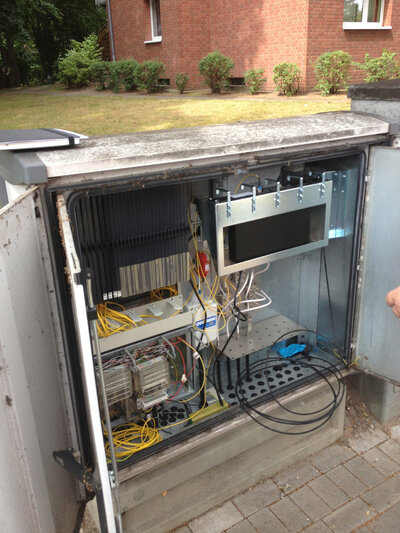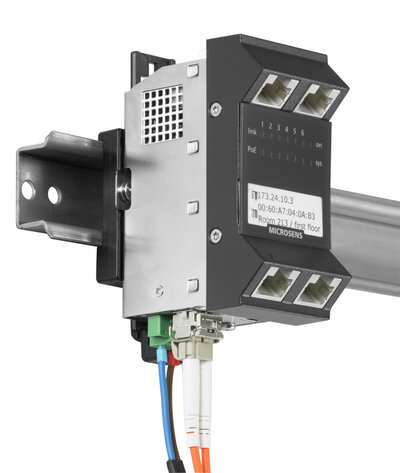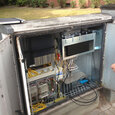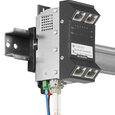
wilhelm.tel offers it customers in Norderstedt, Germany comprehensive WLAN city network based on ruggedized MICROSENS switches
Recognising the signs of the times
Those responsible at the Norderstedt public utility company had recognised the signs of the times even before the end of the last millennium. In 1999 they founded an internal communication company - wilhelm.tel - and built up a high performance glass fiber network that now extends as far as Hamburg. Meanwhile, almost 90% of Norderstedt's population count among wilhelm.tel's customers and the fluctuation is almost negligible. But rather than resting on its laurels, the company set new ambitions goals: comprehensive WLAN coverage in Norderstedt. The impetus for the project was provided by the State Garden Show staged in 2011 in the city of 75,000 inhabitants. The wilhlem.tel management wanted to build up its own WLAN for this event in the city park and in so doing to guide interested visitors to the Energy Pavilion. An outstanding idea whose implementation was now put into the hands of the technology experts at wilhelm.tel. The 80 hectare area was fitted with 20 access points and the visitors to the State Garden Show could log into the network for half an hour free of charge. If they wanted to use the WLAN the whole day, they had the chance to pick up a voucher in the Energy Pavilion. The team from the public utilities company gathered initial experience from this first test, especially in organizational matters concerning customer acceptance and usage patterns.
From pilot project to comprehensive WLAN coverage
Over 172 days in 2011, the State Garden Show attracted 600,000 visitors from near and far to Norderstedt. The technical feasibility was put to the test on a small scale, now the decision had to be made as to whether investment in comprehensive WLAN coverage should go ahead. A large number of arguments spoke in favour of such a decision:
- Mobile data usage is increasing continuously.
- Free WLAN for customers has a positive influence on the selection of telecommunication provider among private individuals and corporate customers.
- Customer loyalty is stronger.
- Companies and traders can offer their customers or employees their own access point.
- Electricity and communication networks are converging.
And then, of course, there are the Norderstedt public utility company's public service obligations. They ensure a functioning infrastructure for supply, telecommunication, leisure and traffic. Besides all the economic aspects, soft factors like locational advantages for companies and city dwellers also count here. All these aspects led to the decision to implement the project under the name Mobyklick.

Full switch functionality under adverse conditions
The general conditions for setting up a comprehensive WLAN coverage are rather favourable in Norderstedt. After all, wilhelm.tel has its own glass fiber network of over 1,100 kilometres and the customers profit from speeds up to 100 Mbps right up to the house connection. Wireless access points mounted on road masts are now connected with the glass fiber network via robust Gigabit Switches installed in cable distribution cabinets. Malte Kock, who is responsible for network planning at wilhelm.tel, compiled a catalogue of requirements.
- PoE/PoE+ functionality: The access points are also supplied with electricity from the switches.
- Compact design: There is little space available in the cable distributors and switching boxes for installing the switches.
- Robustness: The outdoor distribution cabinets are subject to high temperature fluctuations.
- Energy efficiency: Every switch should have three or four ports that can be activated on demand, which only consume electricity on activation.
Based on these criteria, wilhelm.tel put the project out to tender and received offers from eight different companies. A German manufacturer came out on top: The switches from MICROSENS convinced the team from wilhelm.tel firstly in that all the functions required were included within the scope of delivery. Secondly, the manufacturer scored with a clear advantage in maintenance. The configuration of the switches is stored on an SD card. If a switch has to be replaced in the hardware, the SD card just needs to be inserted in the new switch and it is fully functional immediately.
There is no such thing as impossible
Nevertheless, a challenge still has to be mastered: The MICROSENS industrial switches are suitable for far greater loads in the industrial environment and also have to withstand strong vibrations, for example in rail transport or wind turbines. Requirements that did not apply for wilhelm.tel, but which still affect the price of the available variants. Without further ado, MICROSENS developed an adapted switch version for the project that was optimally matched to the requirements of city networks. The Ruggedized Micro Switch emerged with a total of six Gigabit ports for mounting on the top-hat rail. Malte Kock is impressed with the responsiveness of the manufacturer: "Within a very short time we were able to test the modified switch and it met our expectations to a tee. Now we were able to actually implement our ambitious project, because with the planned expansion of the network with a four-figure number of switches, we had to keep a very close watch not to pay for any superfluous features." The Ruggedized Micro Switch offers five 10/100/1000Base-T ports with Power-over-Ethernet+ (PoE+) to IEEE 802.3at to connect terminal devices and a glass fiber uplink port. As the Micro Switch covers an extended temperature range of -25 to+65 °C, it can be installed in the wilhelm.tel double-wall cable distributors without any problems. Moreover, it boasts all the security and management features of the current MICROSENS Industrial Ethernet device generation and also fulfils all security requirements for operating a WLAN network.
On your marks, get set, click
The tender for the project was issued in mid 2013 and by November MobyKlick had already started and WLAN could be used in numerous public areas in Norderstedt. The technology team from wilhelm.tel firstly developed three different module types that were adapted to the on-site requirements. In parallel, the company planned the strategic distribution of the network together with a service provider specialised in WLAN coverage. The access points cover a radius of 100 to 300 meters with the network depending on the location and were firstly installed in highly frequented public spaces. In the city park, around the city hall, at the bus station and along the city's main traffic routes. The network then increasingly branched out into the industrial and residential areas. The response both from the people of the city, as well as from the companies, is enormous. Countless businesses have already indicated their interest in an access point in their premises in order to be in a position to offer their own customers permanent WLAN access. Malte Kock sees wilhelm.tel's strategy confirmed in all areas: "Organisationally and technically we would make the same decisions just the same every time. The network functions perfectly - we have already measured download speeds of up to 98 Mbps - our customers find that absolutely fantastic." In addition, anyone visiting Norderstedt can click into the network as a visitor: As well as free and permanent access with three terminal devices for wilhelm.tel customers, there is also a voucher for 24-hour free use of the network.
Access Point mounted on street lamp
Ruggedized MICROSENS Micro-Switch with power supply
Access Point mounted on street mast


A propos de MICROSENS
La transmission d'informations par des connexions à fibres optiques présente de nombreux avantages. MICROSENS GmbH & Co. KG l'a reconnu très tôt. L'entreprise, qui fait partie des pionniers, développe et produit des systèmes de communication et de transmission à haute performance en Allemagne depuis 1993. Adaptés individuellement aux exigences des différents domaines d'utilisation et intégrés dans des concepts globaux pour les différentes industries. Mais surtout, proche du client. Les défis techniques des projets des clients se répercutent directement sur le développement des produits. Il en résulte des solutions d'automatisation basées sur IP pour les bâtiments modernes, des concepts de réseau rentables pour les bureaux et les postes de travail, des solutions robustes et à sécurité intégrée pour les environnements industriels, des systèmes de transport optique pour les réseaux étendus d'avenir et la liaison efficace des sites et des centres de données.














